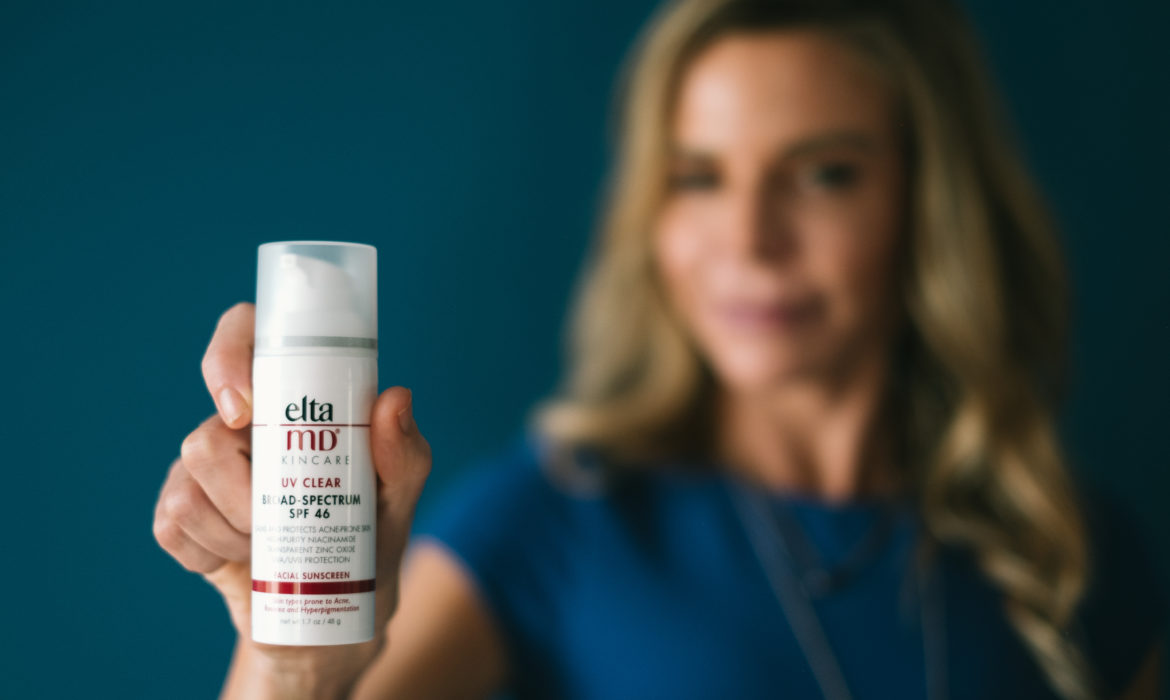The most important skin care product? Sunscreen!
written by our Master Medical Aesthetician, Laurel Glenn
Chemical vs Physical Sunscreen
While many sunscreens block both UVA and UVB rays, they fall into two separate categories: chemical sunscreen and physical sunscreen (often known as mineral sunscreen). Zinc oxide sunscreens and titanium dioxide sunscreens fall into the latter category. Let’s take a closer look at the difference between these two types of sunscreen:
Chemical sunscreen –
- Chemical sunscreen is exactly what it sounds like—a mixture of chemicals that come together to block UVA and UVB rays. These ingredients are tasked with degrading or deactivating sunlight, creating a chemical reaction that transforms UV rays into heat, which is then released from the skin.
Physical sunscreen –
- Physical sunscreen, on the other hand, is made of natural compounds that sit on the surface of the skin. They absorb and deflect sunlight so that UV radiation doesn’t penetrate the epidermis. These ingredients act similarly to aluminum foil or a mirror, keeping sunlight from penetrating deeply. Sunscreens with zinc oxide and titanium dioxide fall into this category.
- Physical sunscreen “protects from the sun as soon as it’s applied;” chemical sunscreen takes approximately 20 minutes to begin to work.
- Physical sunscreen “lasts longer when in direct UV light;” chemical sunscreen stops working much more rapidly and must be applied more frequently.
- Physical sunscreen is gentle on the skin and less likely to clog pores, “making it better for sensitive skin;” chemical sunscreen is much harsher.
Bottom line? No matter your age, what your skin type is, or any particular skin condition you might be dealing with, physical sunscreen is almost always a better choice—and dermatologists agree.
ZINC OXIDE AND TITANIUM OXIDE
If you’re looking into purchasing a physical sunscreen, you’ve likely heard of zinc oxide and titanium dioxide—these are the only FDA-approved physical UV filters for sun protection.
While there has been some hesitation regarding absorption of these compounds through skin, these concerns are unwarranted. According to the Skin Cancer Foundation: “Current research indicates that fears about absorption are unwarranted… The evidence that sunscreens are safe and effective is overwhelming.”
Zinc Oxide
Zinc oxide is derived from zinc, a naturally reflective material. Here are some of the benefits of this physical sunscreen ingredient:
- Sun Protection: Perhaps the most enticing zinc oxide benefit is its strength in protecting your skin against the sun. It is one of the most effective sun protectors available, blocking out both short and long UVA rays and all UVB rays.
While it doesn’t provide as much protection from long-wave UVA rays, titanium dioxide is extremely effective at blocking short-wave UVA and UVB, making it a great choice for casual daily sun exposure.
Schedule a consultation with Sonata Aesthetics today. Serving Broomfield, Denver, Westminster, Boulder, Arvada, and surrounding areas.
Related Posts

1 crucial ingredient for amazing skin
Maintaining high levels of vitamin C is crucial for healthy, glowing skin Written by our Master Medical...

Glo skin care is here!
You have been asking for it! It’s finally at Sonata! Use coupon code SonataVIP for free shipping at our amazing...

Green Beauty is here!
Natural is beautiful! Sometimes our commitment to your skin is, well, skin deep. Yep, it’s true. We’ll keep...


